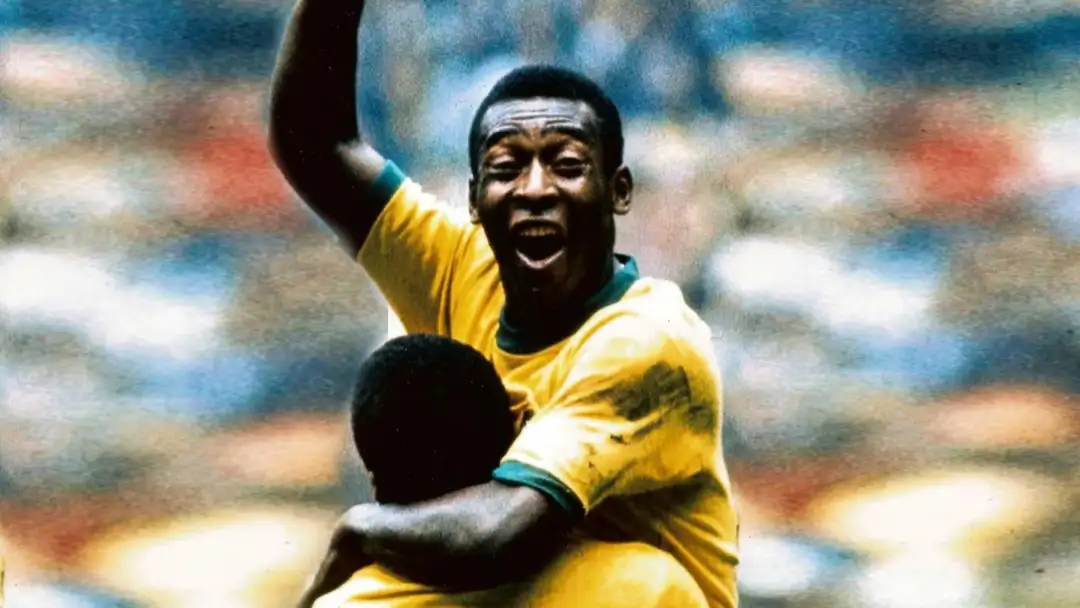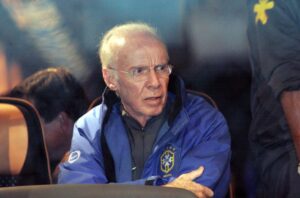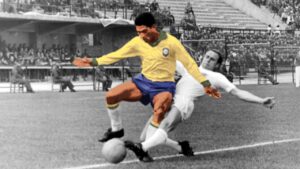13 World Cup Legendary Players Who Changed History
The FIFA World Cup has always been the ultimate stage for greatness — where legends are born, dreams are realized, and history is written in every pass and goal. The World Cup legendary players on this list didn’t just compete; they reshaped football itself. Their brilliance transcended generations, turning matches into memories and inspiring millions around the world.
1) Pelé – The King of Football (Brazil)
At just 17 years old, Pelé burst onto the global scene in 1958, scoring twice in the final to lead Brazil to victory (FIFA). Over his career, he won three World Cups — 1958, 1962, and 1970 — a feat no other player has achieved. His grace, intelligence, and charisma turned Brazil into the symbol of “the beautiful game.” Pelé didn’t just win; he globalized football’s magic.
Alt-text: *Pelé lifting the World Cup trophy after Brazil’s 1970 triumph in Mexico.*
Filename: pele-brazil-world-cup-legend.jpg
2) Diego Maradona – The Magician (Argentina)
Few players ever dominated a World Cup the way Maradona did in Mexico 1986 (The Guardian). With his “Hand of God” goal and the mesmerizing solo run against England, he single-handedly carried Argentina to glory. Maradona’s genius was raw, emotional, and unrepeatable — football artistry wrapped in human imperfection.
Alt-text: *Diego Maradona dribbling through defenders during Argentina’s 1986 World Cup run.*
Filename: maradona-1986-argentina-world-cup.jpg
3) Franz Beckenbauer – The Kaiser (Germany)
Franz Beckenbauer revolutionized the role of the defender by introducing the libero, or “sweeper” position (DW). As captain, he led West Germany to the 1974 title, blending tactical awareness with leadership and elegance. Later, he would lift the trophy again as coach in 1990 — a testament to his football intelligence and legacy beyond the pitch.
Alt-text: *Franz Beckenbauer holding the World Cup trophy after Germany’s 1974 victory.*
Filename: beckenbauer-1974-germany-world-cup.jpg
4) Johan Cruyff – The Visionary (Netherlands)
Cruyff’s Netherlands changed football forever with “Total Football,” where every player could attack and defend seamlessly (The Guardian). Although he never lifted the trophy, Cruyff’s influence reshaped coaching philosophies and inspired generations of creative players. The Oranje of 1974 may not have won, but they left a legacy far greater than a title.
Alt-text: *Johan Cruyff controlling the ball during the 1974 World Cup for the Netherlands.*
Filename: cruyff-1974-netherlands-world-cup.jpg
5) Zinedine Zidane – The Artist (France)
Zidane’s mastery peaked in 1998 when he scored two headers in the final against Brazil, leading France to its first World Cup title (BBC). Known for elegance, vision, and control, Zidane also defined the 2006 tournament — both for his brilliance and his infamous headbutt. His duality made him one of the most complex and fascinating figures in World Cup lore.
Alt-text: *Zinedine Zidane celebrating after scoring in the 1998 World Cup Final.*
Filename: zidane-1998-france-world-cup.jpg
6) Ronaldo Nazário – The Phenomenon (Brazil)
After heartbreak in the 1998 final, Ronaldo returned in 2002 with one of the greatest comebacks ever (Sports Illustrated). He scored eight goals, including two in the final, earning the Golden Boot and Brazil’s fifth title. His pace, technique, and finishing made him a living legend — a player who redefined the modern striker.
Alt-text: *Ronaldo Nazário celebrating his goal in the 2002 World Cup Final for Brazil.*
Filename: ronaldo-2002-brazil-world-cup.jpg
7) Paolo Rossi – The Redeemed Hero (Italy)
Rossi’s journey from suspension to salvation in 1982 is one of football’s greatest redemption stories (The Guardian). He scored six goals — including a hat-trick against Brazil — leading Italy to glory. His fairytale comeback proved how perseverance could rewrite destiny on the world’s stage.
Alt-text: *Paolo Rossi celebrating after scoring against Brazil in the 1982 World Cup.*
Filename: paolo-rossi-1982-italy-world-cup.jpg
8) Miroslav Klose – The Record Breaker (Germany)
Klose’s quiet consistency made history. With 16 goals across four tournaments, he became the World Cup’s all-time top scorer (FIFA). Known for humility and efficiency, he proved that greatness isn’t about flash — it’s about reliability and longevity.
Alt-text: *Miroslav Klose celebrating after scoring his record-breaking World Cup goal for Germany.*
Filename: klose-germany-world-cup-record.jpg
9) Lionel Messi – The Modern Genius (Argentina)
Messi came close in 2014, but it was Qatar 2022 where he completed his destiny (New York Times). With seven goals, unmatched leadership, and a historic final against France, Messi lifted the trophy and solidified his GOAT status. His legacy connects artistry, precision, and emotion — football perfection in motion.
Alt-text: *Lionel Messi lifting the World Cup trophy after Argentina’s 2022 victory.*
Filename: messi-2022-argentina-world-cup.jpg
10) Eusébio – The Panther of Mozambique (Portugal)
Eusébio exploded onto the world stage in 1966, scoring nine goals to earn the Golden Boot and lead Portugal to third place (UEFA). His blend of strength, speed, and flair made him a global icon and pioneer for African-born footballers. Eusébio’s 1966 run remains one of the most inspiring campaigns ever.
Alt-text: *Eusébio celebrating after scoring for Portugal during the 1966 World Cup.*
Filename: eusebio-1966-portugal-world-cup.jpg
11) Lev Yashin – The Black Spider (Soviet Union)
Lev Yashin is still the only goalkeeper to win the Ballon d’Or (FIFA). Known for his commanding presence, reflexes, and signature black kit, he redefined what a goalkeeper could be. Yashin’s courage inspired generations of keepers and established the archetype of the modern shot-stopper.
Alt-text: *Lev Yashin diving to save a shot during a World Cup match for the Soviet Union.*
Filename: lev-yashin-soviet-world-cup.jpg
12) Garrincha – The Joy of the People (Brazil)
Garrincha was the embodiment of joy on the pitch. His unpredictable dribbles and creativity helped Brazil win the 1958 and 1962 World Cups (Sports Illustrated). When Pelé was injured in 1962, Garrincha carried the team to glory — and danced into football folklore forever.
Alt-text: *Garrincha dribbling past defenders during Brazil’s 1962 World Cup run.*
Filename: garrincha-1962-brazil-world-cup.jpg
13) Lothar Matthäus – The Eternal Captain (Germany)
Matthäus remains one of the most enduring figures in World Cup history. Appearing in a record five tournaments (1982–1998), he led Germany to victory in 1990 (DW). His athleticism, leadership, and versatility made him a symbol of consistency and excellence through decades of football evolution.
Alt-text: *Lothar Matthäus holding the World Cup trophy after Germany’s 1990 victory.*
Filename: lothar-matthaus-1990-germany-world-cup.jpg
Conclusion: The Legacy Lives On
These World Cup legendary players didn’t just lift trophies—they redefined greatness. Their performances shaped football’s identity and bridged generations of fans. Every World Cup since has sought echoes of their brilliance, reminding us why this tournament remains the heartbeat of global sport.
FAQ
Who is the greatest World Cup player of all time?
It’s subjective, but names like Pelé, Maradona, and Messi dominate the debate. Each symbolizes a different era of genius, proving football’s beauty evolves with time.
Which player has appeared in the most World Cups?
Lothar Matthäus holds the record with five appearances between 1982 and 1998, demonstrating longevity few can match (DW).
Suggested Internal Reads: 15 Bizarre and Unforgettable On-Pitch Incidents · 15 Statistical Oddities from 90+ Years of World Cup Matches · 15 Surprising Rules That Have Existed in Past World Cups



